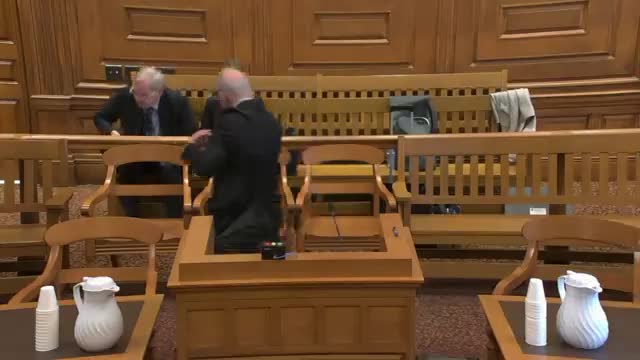Court hears explosive arguments in controversial medical malpractice case
November 08, 2024 | Judicial - Appeals Court Oral Arguments, Judicial, Massachusetts
This article was created by AI summarizing key points discussed. AI makes mistakes, so for full details and context, please refer to the video of the full meeting. Please report any errors so we can fix them. Report an error »

In a recent court hearing, the defense for Dr. Milton Medina, represented by attorneys Michael Rossett and Kimberly Iverson Tufo, argued for a new trial based on several key points of contention regarding the admissibility of testimony and jury instructions. Central to their appeal was the controversial \"hug\" testimony, which they claimed unfairly influenced the jury's perception of Dr. Medina.
The defense contended that the trial judge's refusal to grant a mistrial after the introduction of this testimony constituted reversible error. They argued that the testimony, which painted Dr. Medina in a negative light, was not relevant to the case and should have been disregarded. The defense maintained that they made timely requests for the jury to disregard the testimony, which the judge ultimately allowed to remain in consideration.
During the hearing, the defense highlighted that the hug testimony was not mentioned in the initial trial discussions or in the plaintiff's expert disclosures, suggesting it was a tactical surprise intended to sway the jury's opinion. They emphasized that the testimony did not relate to the standard of care or informed consent, which were the primary issues at trial.
The defense also raised concerns about the jury instructions provided by the judge, arguing that the language used diluted the \"but for\" causation standard necessary for establishing negligence. They claimed that the jury was confused by the instructions, which included phrases like \"did it have an impact\" and \"was it a factor,\" potentially leading to an improper verdict.
In response, the plaintiff's counsel, Austin Freely, defended the relevance of the hug testimony, arguing it demonstrated Dr. Medina's consciousness of liability and was part of the narrative necessary for the jury to understand the context of the case. He acknowledged the prejudicial nature of the testimony but maintained that it was permissible for the plaintiff to present her story fully.
The court's decision on whether to grant a new trial will hinge on the perceived impact of the hug testimony and the adequacy of the jury instructions. The defense's arguments suggest a significant concern over the fairness of the trial process, while the plaintiff's side insists on the relevance of all presented evidence. The outcome of this appeal could have broader implications for how similar cases are handled in the future, particularly regarding the admissibility of potentially prejudicial testimony.
The defense contended that the trial judge's refusal to grant a mistrial after the introduction of this testimony constituted reversible error. They argued that the testimony, which painted Dr. Medina in a negative light, was not relevant to the case and should have been disregarded. The defense maintained that they made timely requests for the jury to disregard the testimony, which the judge ultimately allowed to remain in consideration.
During the hearing, the defense highlighted that the hug testimony was not mentioned in the initial trial discussions or in the plaintiff's expert disclosures, suggesting it was a tactical surprise intended to sway the jury's opinion. They emphasized that the testimony did not relate to the standard of care or informed consent, which were the primary issues at trial.
The defense also raised concerns about the jury instructions provided by the judge, arguing that the language used diluted the \"but for\" causation standard necessary for establishing negligence. They claimed that the jury was confused by the instructions, which included phrases like \"did it have an impact\" and \"was it a factor,\" potentially leading to an improper verdict.
In response, the plaintiff's counsel, Austin Freely, defended the relevance of the hug testimony, arguing it demonstrated Dr. Medina's consciousness of liability and was part of the narrative necessary for the jury to understand the context of the case. He acknowledged the prejudicial nature of the testimony but maintained that it was permissible for the plaintiff to present her story fully.
The court's decision on whether to grant a new trial will hinge on the perceived impact of the hug testimony and the adequacy of the jury instructions. The defense's arguments suggest a significant concern over the fairness of the trial process, while the plaintiff's side insists on the relevance of all presented evidence. The outcome of this appeal could have broader implications for how similar cases are handled in the future, particularly regarding the admissibility of potentially prejudicial testimony.
Don't Miss a Word: See the Full Meeting!
Go beyond summaries. Unlock every video, transcript, and key insight with a Founder Membership.
✓
Get instant access to full meeting videos
✓
Search and clip any phrase from complete transcripts
✓
Receive AI-powered summaries & custom alerts
✓
Enjoy lifetime, unrestricted access to government data
30-day money-back guarantee

